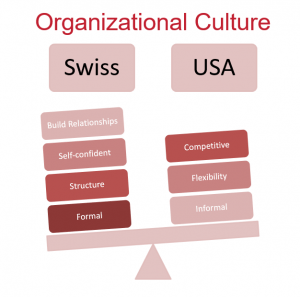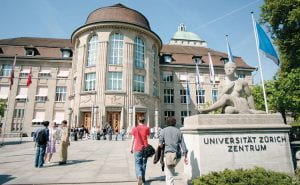How do stereotypes influence our behavior at work? Are our instincts accurate? A recent article in the online magazine Swissinfo described some of the challenges, large and small, amusing and potentially embarrassing, of working as an ‘incomer’ in a Swiss company. Would you expect to be formal with Swiss colleagues? Think deadlines are important? Expect consensus must be reached in meetings? For those of us in communication roles, deciphering the cultural cues and office codes is especially critical. As  my colleague, Patty Goodman, often reminds me, we need to be aware of our biases, keen observers, and learn as much as we can about cultural values.
my colleague, Patty Goodman, often reminds me, we need to be aware of our biases, keen observers, and learn as much as we can about cultural values.
So what are the answers to the questions posed in the Swissinfo article?
Yes, generally, interaction within Swiss organizations is more formal. Deadlines are taken very seriously. The decision-making process tends to be more inclusive and time-consuming. These are generalizations of course. And, as we know, every organization has its own distinctive culture. A large global bank, like Credit Suisse, has a very different culture than a late stage biotech start-up.
The article also prompted me to get in touch with Bianca Gasser, CPS’16, a Swiss alumna of our program. During her course of study in Boston, Bianca had internships at a couple of local PR firms. She now works at ETH Zurich, Switzerland’s premier science and technology university with more than 20,000 students. Bianca is the communication director for ETH Zurich’s real estate department, responsible for internal communication, as well as  external stakeholder communication with the support of ETH’s media relations team.
external stakeholder communication with the support of ETH’s media relations team.
I asked Bianca about some of her experiences as a communicator in a large Swiss organization.
CZ: In North American organizations, we’ve seen an effort to integrate or at least coordinate communication functions (employee communication, PR, marketing communication, etc.) – building bridges across what Diane Gayeski (2011) calls the “islands of communication.” Have you observed a similar trend in Swiss organizations?
 BG: In the Swiss organizations I have worked in so far, I have seen both: Generalist roles in which you do a bit of everything and very specialized roles in one field (for example social media, PR etc.). I kind of like the generalist role, because you work in different fields of communications. In bigger companies, as a generalist you often get support from more specialized functions if you need it. For example, if I have to answer a media request, I always do that with the help of our media relations team.
BG: In the Swiss organizations I have worked in so far, I have seen both: Generalist roles in which you do a bit of everything and very specialized roles in one field (for example social media, PR etc.). I kind of like the generalist role, because you work in different fields of communications. In bigger companies, as a generalist you often get support from more specialized functions if you need it. For example, if I have to answer a media request, I always do that with the help of our media relations team.
CZ: As you well know, we’ve seen widespread adoption of social media, not just for communicating with customers, but also with internal stakeholders. Has social media been adopted by Swiss organizations to the same extent? What have you observe, for instance, at ETH?
BG: I feel that it very much depends on the size of the company. In bigger companies, you often have a social media application for the internal stakeholders. In smaller ones, that is not very common. For ETH Zurich, it is not very focused on internal communication via social media.
CZ: In our curriculum, we place a great deal of emphasis on communication assessment, thinking about ways we can measure the impact of communication on the attitudes and behaviors of our target audiences. Is this the case in your organization?
BG: Yes and no, the impact of our communication via the website definitely gets measured. This is also kind of an easy thing to measure. By measuring the clicks, we know very well which articles and themes are of interest for our target audience. We also do measure our image in the media. On the other hand, there are quite a lot of communication activities (mostly internal ones) that don’t get measured. I feel like these often gets forgotten in the daily rush.
CZ: Indeed, that is often the case in the organizations I’m familiar with; we are so caught up in the daily whirl of activity that we lose sight of whether we’re having an impact.
Bianca, you’ve mentioned to me that you feel more confident operating within a Swiss organization because you’ve grown up within that culture. What advice would you give a non-Swiss who is hired into a Swiss communication department. What are some ways to fit in?
BG: The fact that everything is very formal and punctual in Switzerland and a lot more informal and relaxed in the USA was also a big change for me. I also feel more confident working in Switzerland. I don‘t know exactly why, but certainly language and culture play a big role. It just feels like I know how everything works and that was a feeling I missed while working in America.
Here’s my advice for an expat. Be punctual, don’t show off, and build credibility with your colleagues by demonstrating your competencies. Swiss people might seem a bit reserved at first, but once you get to know them better they will warm up, and you can have a great time with them!
A key takeaway from my conversation with Bianca is the balancing act necessary to work and communicate in cross-cultural environments. Being aware of one’s own tendencies and values is critical in order to become culturally agile within a work environment. Do we flourish in a discovery mode, exploring other cultures with all the challenges that entails. Or do we find strength operating within our own cultural setting? It is not a matter of right or wrong, but what type of experience we’re seeking. The beauty is that in today’s global economy, we have options.
Posted by Carl Zangerl, Faculty
Reference
Gayeski, D. M. (2011). Strategic Approaches to Managing the Communications Function. In T. Gillis, Editor, The IABC Handbook of Organizational Communication. San Francisco: Jossey-Bass.